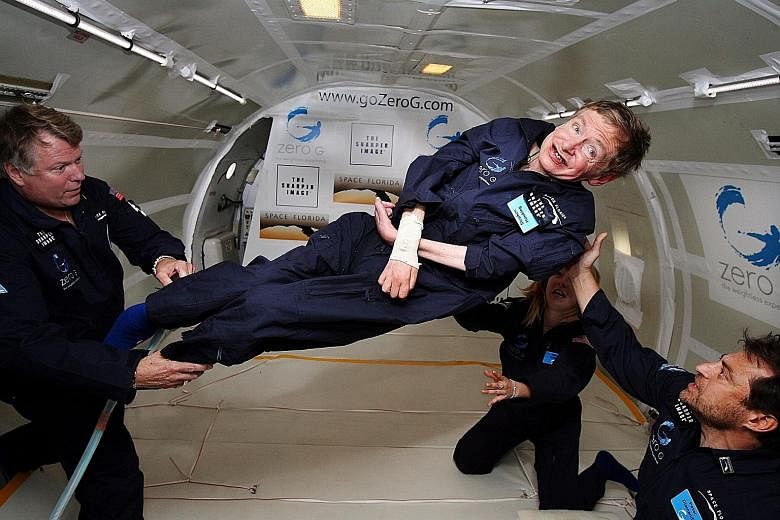NEW YORK • The emblem of human determination and curiosity, Cambridge University scientist and best-selling author Stephen Hawking roamed the cosmos from a wheelchair, pondering the nature of gravity and the origin of the universe.
"Not since Albert Einstein has a scientist so captured the public imagination and endeared himself to tens of millions of people around the world," Professor Michio Kaku at the City University of New York, said in an interview.
Scientifically, Dr Hawking, who died at the age of 76 yesterday, will be best remembered for a discovery so strange that it might be expressed in the form of a Zen koan: When is a black hole not black? When it explodes.
What is equally amazing is that he had a career at all. As a graduate student in 1963, he learned that he had amyotrophic lateral sclerosis, a neuromuscular wasting disease, and was given only a few years to live.
He went on to become his generation's leader in exploring gravity and the properties of black holes, the bottomless gravitational pits so deep and dense that not even light can escape them.
That work led to a turning point in modern physics, playing itself out in the closing months of 1973 on the walls of his brain when Dr Hawking set out to apply quantum theory, the weird laws that govern subatomic reality, to black holes.
In a long and daunting calculation, Dr Hawking discovered to his befuddlement that black holes - those mythological avatars of cosmic doom - were not really black at all. In fact, he found, they would eventually fizzle, leaking radiation and particles, and finally explode and disappear over the aeons.
Nobody, including Dr Hawking himself, believed it at first - that particles could be coming out of a black hole. That calculation, in a thesis published in 1974 in the journal Nature under the title "Black Hole Explosions?," is hailed by scientists as the first great landmark in the struggle to find a single theory of nature - to connect gravity and quantum mechanics, those warring descriptions of the large and the small, to explain a universe that seems stranger than anybody had thought.
The discovery of Hawking radiation, as it is known, transformed black holes from destroyers to creators - or at least to recyclers - and wrenched the dream of a final theory in a strange, new direction.
"The most important thing about Hawking radiation is that it shows that the black hole is not cut off from the rest of the universe," Dr Hawking said.
It also meant that black holes had a temperature and had entropy.
The discovery of black hole radiation also led to a 30-year controversy over the fate of things that had fallen into a black hole.
Dr Hawking initially said that detailed information about whatever had fallen in would be lost forever, but admitted defeat in 2004. Whatever information goes into a black hole will come back out when it explodes. One consequence, he noted sadly, was that one could not use black holes to escape to another universe. "I'm sorry to disappoint science fiction fans," he said.
Yesterday morning , his family released a statement confirming his death, saying: "We are deeply saddened that our beloved father passed away today. He was a great scientist and an extraordinary man whose work and legacy will live on for many years.
"His courage and persistence with his brilliance and humour inspired people across the world. He once said, 'It would not be much of a universe if it wasn't home to the people you love.' We will miss him forever."
Having spent the best part of his life grappling with black holes and cosmic doom, Dr Hawking had no fear of the dark.
"They're named black holes because they are related to human fears of being destroyed or gobbled up," he once told an interviewer. "I don't have fears of being thrown into them. I understand them. I feel in a sense that I am their master."
NYTIMES

